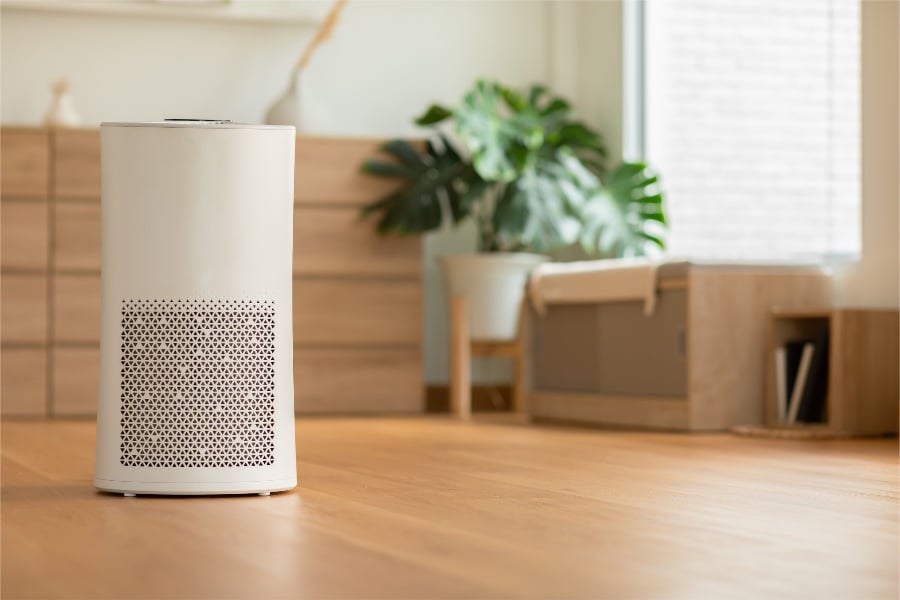Indoor air quality is an often overlooked aspect of home living, but it plays a major role in our overall health and well-being. Most people don’t realize the air inside our homes can harbor a variety of pollutants, from common dust to less obvious troublemakers like mold spores and chemical vapors. Even wildfires can affect your indoor air quality. These pollutants can significantly affect our health, contributing to allergies, respiratory issues, and overall discomfort.
Understanding Indoor Air Quality
Think of Indoor Air Quality (IAQ) as the invisible part of your home that can make a difference in how you feel. Good IAQ means the air is fresh, clear of pollutants, and comfortable, making your indoor spaces feel great.
From the fluff of your fur babies to the tiny particles that drift in from outside, these pollutants can come from all sorts of places. Yes, that means your cozy living room rug, the cleaning sprays in the cupboard, or even your favorite scented candles are all culprits.
How Poor Indoor Air Quality Can Affect Your Health
If you’ve ever walked into a room and started sneezing, or felt your eyes water for no clear reason, your body could be telling you something about the air quality.
And it's not just us; our homes feel it too. Poor air quality can lead to unwanted guests like mold and mildew, which thrive in damp, poorly ventilated spaces. This can cause damage to the structure of our homes and have serious implications for our health.
How Does Your Air Quality Measure Up?
Recognizing signs of poor indoor air quality is the first step toward improvement.
Telltale signs include:
- Unusual odors
- Worsening allergy symptoms
To get a more concrete assessment, consider using home testing kits to measure specific pollutant levels. If you’re looking for more insight, you can video chat with one of our Experts to get help identifying signs your indoor air quality has declined. They can also answer any questions about how your HVAC system may be influencing your home’s air.
Tips to Improve Air Quality in Your Home
Maintaining good air quality inside your home requires consistent attention. Monitoring and improving indoor air quality can significantly impact your overall health and comfort.
Regular Maintenance and Cleaning
Keeping your home's air quality at healthy levels is kind of like tending to a garden – it needs regular care and attention. Frequent maintenance and cleaning can make a world of difference. Here’s how to stay on top of it:
- Change Your Air Filters Regularly: Aim to replace your air filter every couple of months, depending on your usage and filter style.
- Keep Those Vents Clean: Over time, dust and debris can build up in your ducts and dryer vents, affecting air flow and quality.
- Vacuum with a HEPA Filter: These filters are champs at trapping tiny particles that other vacuums might miss.
- Mind Your Humidity Levels: Too much moisture can invite mold. A dehumidifier can help keep things balanced.
Smart Home Solutions
Enhancing your home's air quality can be surprisingly straightforward, thanks to the wonders of technology. There are plenty of home gadgets on the market that can help you automatically reduce pollutants and moisture in your home.
Consider investing in:
-
UV light system
-
A dehumidifier or humidifier depending on needs
-
Improving your air filter system on your HVAC
Not sure where to start? Frontdoor Experts can guide you in picking the right gadgets and even help with installation details.
Natural Methods
If you’d like to go au naturale, you’ve got even more options. Sometimes, the best solutions are the ones nature provides. Integrating natural elements into your home can significantly boost your indoor air quality, and it adds a touch of green beauty too:
- Indoor Plants for Natural Purification: Spider plants, snake plants, and peace lilies are not only lovely to look at but great for cleaning the air.
- Embrace Natural Ventilation: Depending on the day, open those windows to let fresh air in.
- Be Mindful of Household Products: Choosing cleaning products with fewer chemicals helps reduce indoor air pollutants.
Incorporating these practices into your daily routine can transform your home into a fresher, healthier living space. With a little effort and the right choices, you’ll breathe easier knowing your home’s air is clean and comfortable.
When to Talk to an Expert
If you find yourself wondering if you're taking the right steps or if there's more you could be doing to improve air quality in your home, that's exactly when reaching out to a Frontdoor Expert can make all the difference.
Was this article helpful?




